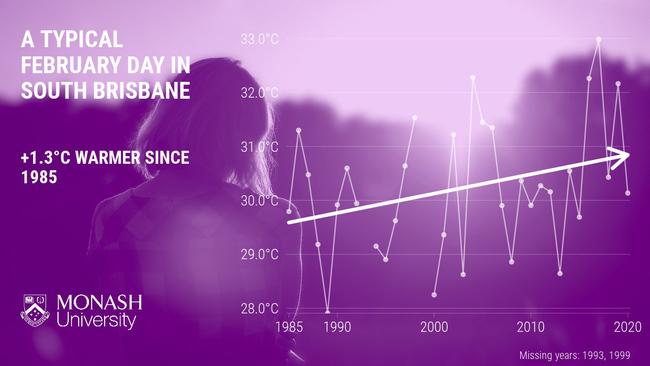Climate latest: February temperatures are increasing over time according to data from the Bureau of Meteorology
Dr Christa Pudmenzky explains south Brisbane's warmer February temperatures. Plus, resident Jonathan Galbraith discusses how the local climate is changing in the region.

HyperLocal
Don't miss out on the headlines from HyperLocal. Followed categories will be added to My News.
The southern suburbs are in for a warm but cloudy weekend, with temperatures in the mid-30s and a chance of light showers on Saturday and Sunday.
Data from the Bureau of Meteorology indicates February temperatures have increased significantly since 1985.
A typical February day in south Brisbane is around 31 degrees, around one degree warmer than 35 years ago.
While this might not sound like much, higher average daily temperatures mean more extreme heat days, longer heatwaves and more frequent fire danger days.
Voices from your community
The data matched the experience of Mount Gravatt resident, Jonathan Galbraith, who felt that summers felt hotter, longer and came earlier.
"Record high temperatures are occurring not only during regular summer periods but during months that are traditionally cooler," he said.
"Rain is occurring at irregular times of year and periods of both extreme heat and extreme rain are becoming more frequent.
"I tend to leave home early morning and come back late afternoon to avoid the heat as I cycle to and from work."
Community voices like Jonathan's tell us how residents and business owners in south Brisbane feel about their local climate. If you would like to contribute your voice to our column, you can fill out our 5-minute survey here.
Fast fact
Not only are our summers getting hotter, they're also getting longer.
Research from the Australia Institute found that Brisbane summers are 11 days longer than they were in the mid-20th century.
The research also found Brisbane winters are now 31 days shorter than they used to be.
In fact, all capital cities across Australia are experiencing longer summers and shorter winters.
At least 97 per cent of climate scientists agree that global warming is linked to rising greenhouse gas emissions from human activities such as burning fossil fuels like coal, oil and natural gas, NASA's Global Climate Change website states.
Dr Christa Pudmenzky is a climate scientist at the University of Southern Queensland.
This column is part of a collaboration between Monash University and News Corp to deliver hyperlocal weather and climate information.
Questions? You can email us at mcccrh@monash.edu

